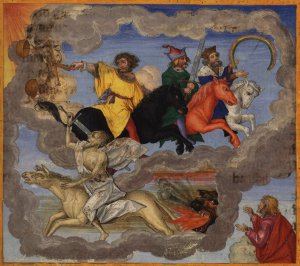
Americans who believe Jesus will return within 30 or 40 years would seem to have motivation to make different personal and political choices than those who aren’t sure if or when the world will end. And those choices may not be in anyone’s best interest if the world doesn’t end on schedule.
This past summer, a Pew Research Center Study found that 41% of Americans expect Jesus Christ to return within four decades. This was pretty much flat from a similar 1999 study that found 44% of Americans held such a belief. While the specifics of what will happen when Christ returns are not well agreed upon across Christian groups, it’s fair to say there is agreement that secular institutions like governments and banks will cease to be even a little bit important once He arrives. So for all intents and purposes, we can say that 4 in 10 people expect the world to end by 2040, give or take a few years.
If, as an individual, you were convinced you would inherit a fortune from your eccentric uncle before you reached retirement age, you would certainly have little motivation to invest in your 401k, open any IRAs, or save up for that beach villa in Florida. You might even rack up big debts in your middle years, confident you’d have the means to pay those off down the road.
Similarly, if you are convinced the world will end before 2040, there’s little incentive to invest in America’s long term future. Social Security will still be pretty solvent then. We can patch the roads and bridges up to get another three decades out of them. The planet won’t quite be out of oil yet, and the pollution probably won’t have made the Earth unlivable. So why worry? Jesus will return and set it all straight. All that really matters is that your spiritual life is in order to assure you are risen up.
Of course, if the world doesn’t end when it’s supposed to, then we’re all in deep tapioca. The end times have been predicted repeatedly since 30AD, then reached a fever pitch of predictions with the advent of dispensationalism in the mid-19th century. But so far, we’re still here. To those of us remaining uncertain the end is neigh, it seems only prudent to plan for the future.
It might also be expected that some end time believers would hedge their bets for the sake of their children and grandchildren and invest in tomorrow anyway—just in case. But even if that’s half the group, it still means 20% have no vested interest in the future of the country. On the other hand, it would also be consistent for end time believers to simply check-out of politics altogether. After all, why should they care one way or the other.
It’s not clear there is any uniform code of Christian behavior for the final decades. People might conceivably rationalize all kinds of things. But coming to terms with the end, whether you are looking forward to it or not, has to have profound implications for how you live your life. That in turn has to influence how you vote and what political policies you would support or oppose.
It would be very educational if some end time believers would connect some of those dots and illuminate the path they are on for the rest of us. The world might make a tad more sense if we understood how end time beliefs translated into secular world behavior.
